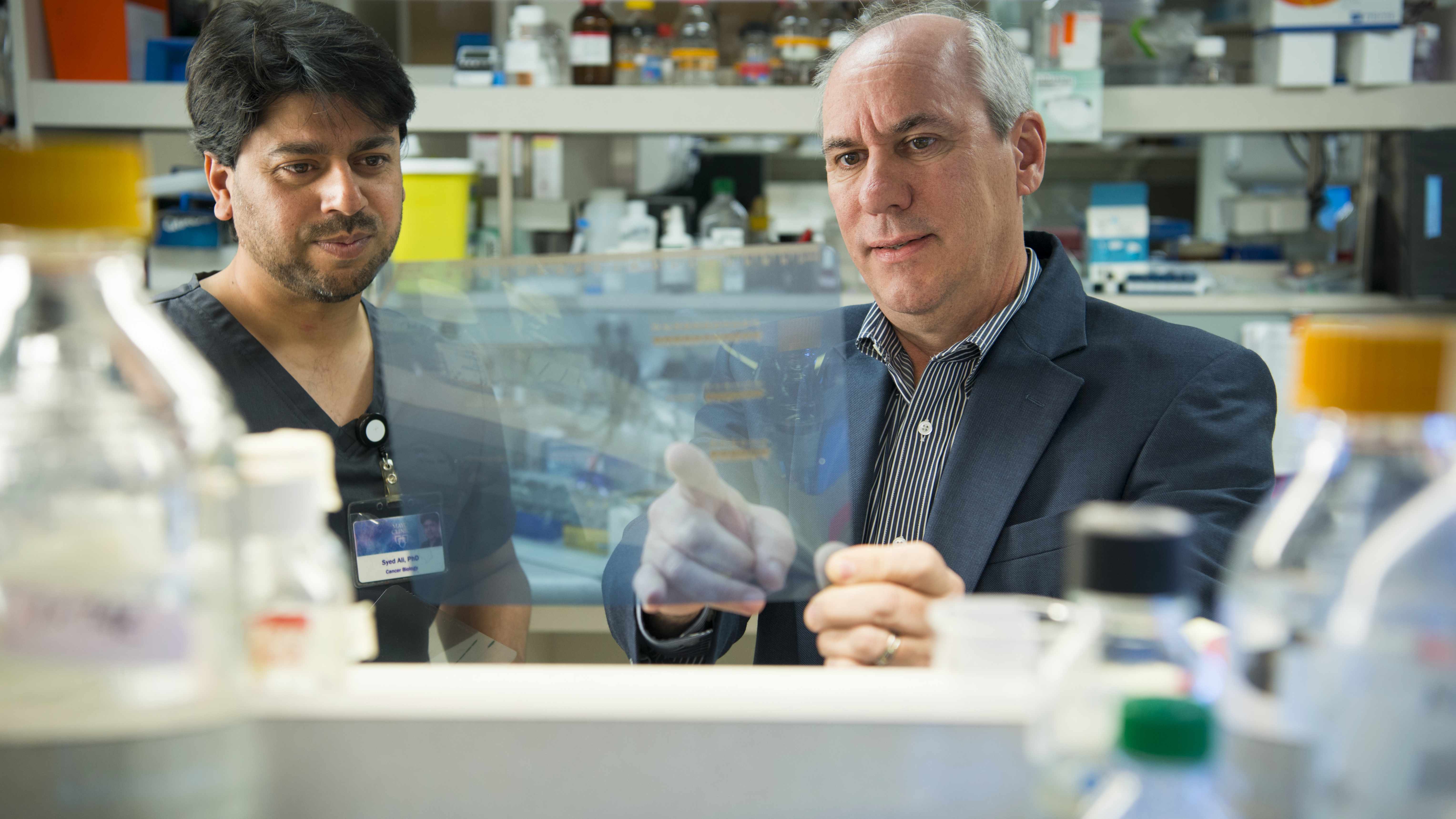-
Drug Combo Shuts Down Stem Cells, Tumor Growth in Lung Cancer
 JACKSONVILLE, Fla. — Researchers on Mayo Clinic’s Florida campus have shut down one of the most common and lethal forms of lung cancer by combining the rheumatoid arthritis drug auranofin with an experimental targeted agent.
JACKSONVILLE, Fla. — Researchers on Mayo Clinic’s Florida campus have shut down one of the most common and lethal forms of lung cancer by combining the rheumatoid arthritis drug auranofin with an experimental targeted agent.
The combination therapy worked in a laboratory study to stop lung adenocarcinoma associated with mutation of the KRAS gene. The study will be published in the March 14 issue of Cancer Cell.
“If our approach works in KRAS-mediated lung adenocarcinoma, it may work in other KRAS-mediated cancers, such as pancreatic and colon cancers, as well as other cancer types,” says the study’s senior author, Alan P. Fields, Ph.D., a cancer biologist and the Monica Flynn Jacoby Professor of Cancer Research in the Department of Cancer Biology at Mayo Clinic in Florida.
Based on this and other preclinical research from Dr. Fields’ team, Mayo Clinic is conducting early-phase clinical trials to test the effectiveness of auranofin alone and in targeted combinations in patients with KRAS-mediated lung adenocarcinoma, ovarian cancer, and another common lung cancer called lung squamous cell carcinoma.
MEDIA CONTACT: Kevin Punsky, Mayo Clinic Public Affairs, 904-953-0746, email: punsky.kevin@mayo.edu
Journalists: Sound bites with Dr. Fields are available in the downloads.
The current study:
- Identified the cancer stem cells that drive development of cancer cells in KRAS-mediated lung adenocarcinoma
- Identified a major signaling pathway, or set of molecular mechanisms, that stimulates the growth of those cancer stem cells
- Showed how combining auranofin and the experimental agent shut down that pathway, and may be an effective treatment approach
“Cancer stem cells are the really bad actors in many cancers,” Dr. Fields says. “Cancer stem cells initiate cancer development, drive its growth and metastasis, and also develop resistance to treatments.
“Conventional chemotherapy can effectively kill non-stem cancer cells, but cancer stem cells often survive,” Dr. Fields says. “Then, once therapy is stopped, these cancer stem cells can re-establish the tumor and cause a relapse.”
The current research study built upon previous research from Dr. Fields’ laboratory that:
- Identified protein kinase C iota (PKCiota) as an oncogene – a gene that has the potential to cause cancer – and linked it to multiple forms of cancer
- Showed that auranofin inhibits PKCiota and may be useful in treating cancer
- Found PKCiota activates a second oncogene, known as SOX2, to stimulate cancer stem cell growth in lung squamous cell carcinoma.
Dr. Fields says the current study surprisingly found that PKCiota regulates cancer stem cells through a different pathway in KRAS-mediated lung adenocarcinoma than in lung squamous cell carcinoma. It also activates a different oncogene, known as NOTCH3. This enabled an individualized approach.
“Using this knowledge, we treated KRAS-mediated lung adenocarcinoma tumors in mice with auranofin and a NOTCH3 inhibitor,” says the study’s first author, Syed A. Ali, Ph.D., a postdoctoral researcher in Fields’ lab. “We found that these two drugs work better together than either drug did alone.”
“This research indicates auranofin might be useful in treating many different cancer types,” Dr. Fields says. “By combining it with a second agent targeted to the specific signaling pathway, we hope to fine-tune therapy to the particular vulnerabilities of each type of tumor,” Dr. Fields says.
“This approach may be useful in multiple forms of lung, ovarian, pancreatic, and possibly head and neck, cervical, and several other cancers,” Dr. Fields says.
Study co-authors – all of Mayo Clinic – are:
- Verline Justilien, Ph.D.
- Lee Jamieson, Ph.D.
- Nicole R. Murray, Ph.D.
The study was supported by grants from the National Institutes of Health (R01 CA081436-18 and R01 CA140290-05), the Mayo Clinic Center for Individualized Medicine; and a National Institutes of Health Research Supplement to Promote Diversity in Health-related Research Award from the National Cancer Institute.
###
About Mayo Clinic
Mayo Clinic is a nonprofit organization committed to medical research and education, and providing expert, whole-person care to everyone who needs healing. For more information, visit http://www.mayoclinic.org/about-mayo-clinic or https://newsnetwork.mayoclinic.org/







